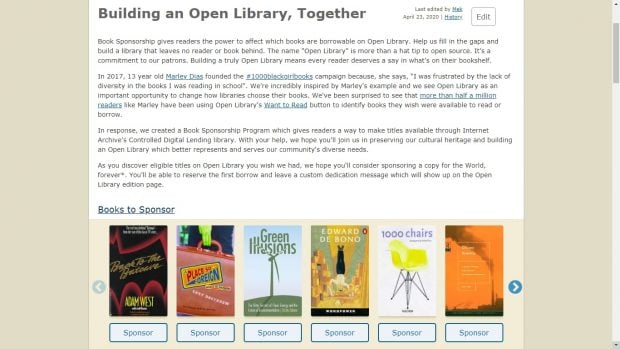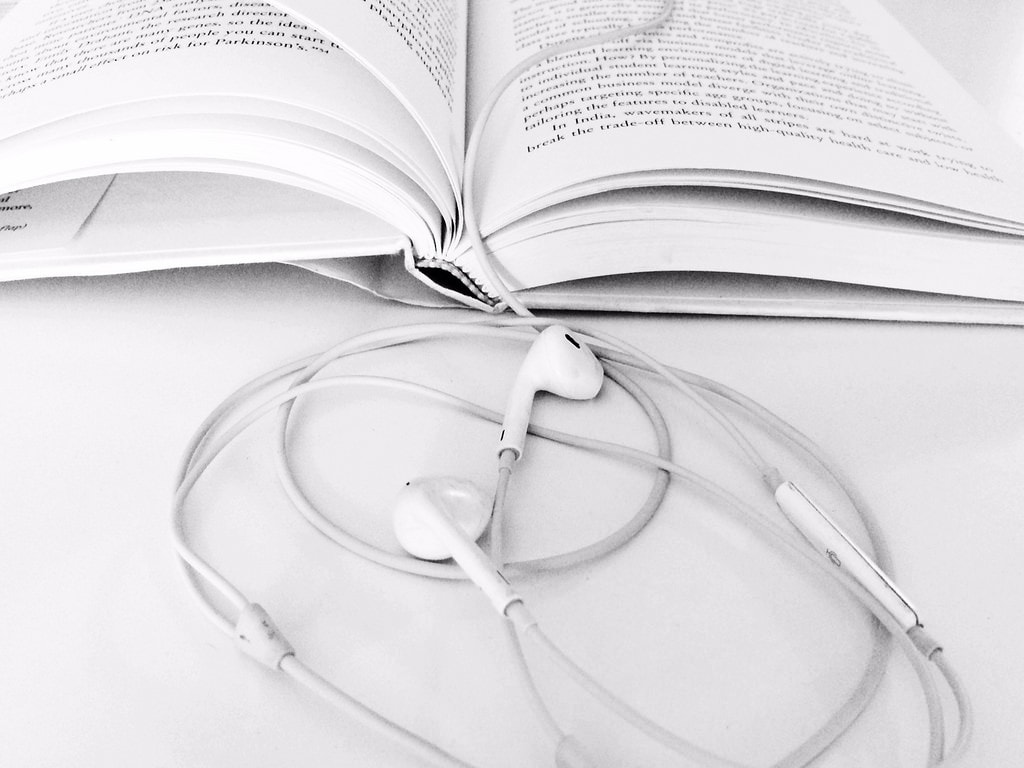Why the Internet Archive’s The Open Library is Not a Real Library

One of the more common arguments made by defenders of the Internet Archive’s site, The Open Library, is that it is a library. They point out that it lends ebooks using expiring licenses and DRM tech quite similar to what public libraries use via Overdrive.
What they are hoping you will overlook is that The Open Library doesn’t source their ebooks like real libraries do. A real library pays for ebook licenses from legit distributors such as Overdrive or Biblioteca, while The Open Library buys and scans used print copies, and then shares copies of the scans. (This is why four publishers filed a copyright infringement lawsuit last week.)
The Open Library even encourages people to donate the purchase price of a used book so it can be scanned and distributed. I discovered via Twitter yesterday that the IA has been encouraging those "sponsorships" since the middle of last year. They even have a page on their site devoted to the effort where they mislead supporters on the legality of the project.
The thing about that page is that any other library wouldn’t ask you to donate the cost of a used book so it could be scanned and shared. Instead, they would ask you to help it buy a license to one of these books.
Other libraries would get that ebook from a legally-authorized distributor, ensuring that the publisher and author got paid for their work. When The Open Library lends an ebook, on the other hand, no one is getting paid.
The simple truth is folks that The Open Library doesn’t act like other libraries because it isn’t a library – it’s a pirate site.


Comments
Nihir June 13, 2020 um 7:52 pm
Perhaps your definition of a library and piracy shouldn’t be so narrow. The very idea that ebooks are licenced instead of purchased and strict llartificial limitations are put on libraries is problematic.
Since the open library purchased or acquired physical copies of their books and only lent out as many copies as they opened, the legality is uncertain at worst.
Copyright today is already broken. Artists not only want to be paid for their work, they believe in a right to keep that work exclusive for commercial gain until almost a century after they die. Newly patented life saving medicine don’t even get close to that level of exclusivity. Copyright was supposed to promote art, but it has been mutilated into this idea of ownership forever which is detrimental to society. It’s been proven on the internet over and over.
See how YouTube’s decentralized nature gave access to rising musicians singing cover songs without paying.
How tiktok basically created an artform out of copying.
And on the other end it’s why we had to endure endless fake happy birthday songs and why do much new art has come from public domain books like Sherlock Holmes and Jane Austen, bit no one can use anything in the last 70+ years without consulting an estate.
That’s not to even talk about how access to culture and art benefit us as a society and libraries are some people’s only access point.
The emergency library definitely crossed a different line, but I think it’s not so clear cut that the open library did.
Seven Dials June 13, 2020 um 8:53 pm
There’s something you have overlooked – there are a large number of, as you put them, real libraries, who have partnered with the not-real library: Internet Archive.
Lois Sanborn June 16, 2020 um 12:49 pm
I have lurked on your blog for a long time and have never commented before, but want to weigh in on this issue. I am a regular person and a regular patron of one of the busiest library systems in the U.S. (Seattle/King County). I love the Internet Archive (IA) and use it all the time. I treat it as a library. I read many books from the twentieth century that are out of print but still in copyright. The libraries only have so much storage space so they cull their collections frequently. If the library no longer has a book, I can most times find a digitized copy at the IA. If the IA doesn’t have it, I buy it from a used online bookstore which means the author doesn’t get any money from that sale. If nobody has it, as a last resort, I’ll try my Inter-Library Loan, but I don’t wish to burden my public library system with my many requests.
I understand the points you are making, and, as someone already said in a related post, let the courts decide on the piracy issues. But I treat the IA as a fair use means of reading books I cannot buy from the publisher or from retail stores.
Chris February 6, 2021 um 7:41 pm
You see folks this is NOT piracy. It’s not even a good example of what piracy is much less copyright piracy is. And if you dont believe this then take a d#mn good look at YouTube. You would have to shut down YouTube as well as several other sites if it were. You see folks, the internet was created to share information for free. Open library is not charging a fee for what they’re doing. They are simply trying to share information that should already be available to the masses without the masses being screwed over by an avarice filled capatilistic system. The authors of any book available on this site should be grateful that their material is being made available on Open Library for ALL to access; especially those who are in the lower socio economic classes! This means EVERYONE has access to be enlightened and educated. And that is the plain and simple truth folks!